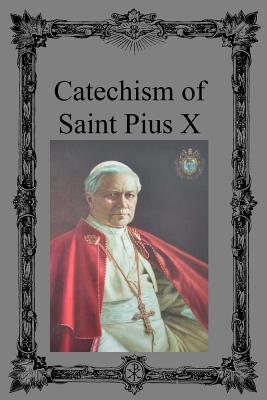Catechism of Saint Pius X

Catechism of Saint Pius X
The Fathers of the Council of Trent showed at a very early date that they were satisfied with none of the existing works, and that they were fully alive to the need and necessity of preparing an authoritative Catechism. The realisation of their desire, however, was retarded for several years by events over which they had little control; and when the work was finally taken in hand another idea prevailed, resulting in the publication of a manual for the use of the clergy, and not, as originally suggested, a Catechism for children and uninstructed adults. Of the countless Catechisms that continued to appear, two - those of Bellarmine and Canisius - have steadily held their ground ever since, and to a large extent have served as the models of nearly an subsequent compilations of the kind. The influence of Canisius, however, has on the whole been limited to Germany; whereas Bellarmine's Catechism, which was written by command of Pope Clement VIII in 1597, has been copied in almost every other country in the world. At an early date it was translated into Arabic, Latin, Modern Greek, French, Spanish, German, English, and Polish. It had the warm approbation of Clement VIII, who prescribed it for use in the Papal States; of Urban VIII, who directed it to be adopted in all the Eastern missions; of Innocent XIII and Benedict XIV; particularly of the very important Council of all Italy, held at Rome, in 1725, which made it obligatory in all the dioceses of the peninsula; and finally of the Vatican Council which indicated it as the model for a proposed universal Catechism. Though Bellarmine's Catechism was largely followed as a model all over the world, yet, owing to the modifications introduced in diocesan editions, it came to pass in the course of time that almost every diocese had its own Catechism, differing in many respects from the Catechisms of other dioceses. The obvious inconvenience of this bewildering multiplicity of Catechisms occupied the attention of the Fathers of the Vatican Council, the great majority of whom were agreed as to the desirability of having a uniform small Catechism for the faithful all over the world. Early during the sittings of the Council, forty-one of the assembled Fathers devoted six sessions (February 10 to February 22) to an examination of the question; and the report which they drew up occupied the attention of the whole Council during the sittings of April 29 and 30. The question being put to a vote on May 4, an immense major
PRP: 115.86 Lei
Acesta este Prețul Recomandat de Producător. Prețul de vânzare al produsului este afișat mai jos.
104.27Lei
104.27Lei
115.86 LeiLivrare in 2-4 saptamani
Descrierea produsului
The Fathers of the Council of Trent showed at a very early date that they were satisfied with none of the existing works, and that they were fully alive to the need and necessity of preparing an authoritative Catechism. The realisation of their desire, however, was retarded for several years by events over which they had little control; and when the work was finally taken in hand another idea prevailed, resulting in the publication of a manual for the use of the clergy, and not, as originally suggested, a Catechism for children and uninstructed adults. Of the countless Catechisms that continued to appear, two - those of Bellarmine and Canisius - have steadily held their ground ever since, and to a large extent have served as the models of nearly an subsequent compilations of the kind. The influence of Canisius, however, has on the whole been limited to Germany; whereas Bellarmine's Catechism, which was written by command of Pope Clement VIII in 1597, has been copied in almost every other country in the world. At an early date it was translated into Arabic, Latin, Modern Greek, French, Spanish, German, English, and Polish. It had the warm approbation of Clement VIII, who prescribed it for use in the Papal States; of Urban VIII, who directed it to be adopted in all the Eastern missions; of Innocent XIII and Benedict XIV; particularly of the very important Council of all Italy, held at Rome, in 1725, which made it obligatory in all the dioceses of the peninsula; and finally of the Vatican Council which indicated it as the model for a proposed universal Catechism. Though Bellarmine's Catechism was largely followed as a model all over the world, yet, owing to the modifications introduced in diocesan editions, it came to pass in the course of time that almost every diocese had its own Catechism, differing in many respects from the Catechisms of other dioceses. The obvious inconvenience of this bewildering multiplicity of Catechisms occupied the attention of the Fathers of the Vatican Council, the great majority of whom were agreed as to the desirability of having a uniform small Catechism for the faithful all over the world. Early during the sittings of the Council, forty-one of the assembled Fathers devoted six sessions (February 10 to February 22) to an examination of the question; and the report which they drew up occupied the attention of the whole Council during the sittings of April 29 and 30. The question being put to a vote on May 4, an immense major
Detaliile produsului











